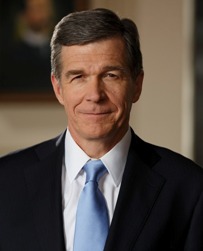A Review of North Carolina Governors Running for US Senate
Only one sitting or former Tar Heel State governor has been elected to the U.S. Senate during the last 70 years

Cooper ran well ahead of the top of the Democratic ticket during his 2020 reelection bid – defeating Lieutenant Governor Dan Forest by 4.5 points as Joe Biden lost the state to President Donald Trump by 1.3 points.
Cooper’s predecessor, Pat McCrory (2013-2017), sought a U.S. Senate seat in 2022, but handily lost the GOP primary by 34.0 points to U.S. Representative Ted Budd.
McCrory was the first sitting or ex-governor from North Carolina to appear on a U.S. Senate ballot in more than three decades and the first ever Republican to do so during the primary era.
Since the turn of the 20th Century, a total of eight North Carolina governors have launched campaigns to win election to the U.S. Senate.
In addition to McCrory’s losing 2022 bid, the other failed campaigns were:
- 1912: Democrat William Kitchin (Governor 1909-1913) lost the Democratic preference primary by 25.5 points to incumbent Furnifold (F.M.) Simmons. The State Democratic Executive Committee canvassed the vote and formally declared Simmons the party’s nominee as a result.
- 1932 special and general: Appointed Democratic U.S. Senator Cameron Morrison (1921-1925) lost both the state’s special and regular primary elections by 3.6 points to attorney Robert Reynolds in runoffs
- 1944: Morrison also lost a third Democratic U.S. Senate primary by 42.7 points to former Governor Clyde Hoey
- 1984: Democrat Jim Hunt (1977-1985; 1993-2001) fell 3.9 points short of unseating incumbent GOP U.S. Senator Jesse Helms
However, a few sitting or former governors were successful in their U.S. Senate campaigns:
- 1944: The aforementioned Clyde Hoey (1937-1941) defeated Republican State Representative Arris Ferree of Asheboro by 40.5 points
- 1948 special and general: Democrat J. Melville Broughton (1941-1945) won the special election unopposed and defeated vice-president of the National Young Republicans John Wilkinson of Washington by 41.9 points in the general
- 1954 special and general: Democrat W. Kerr Scott (1949-1953) won the special election unopposed and defeated Republican attorney and former Raleigh city court Judge Paul West by 31.8 points
- 1986 special and general: Democrat Terry Sanford (1961-1965) unseated appointed U.S. Senator Jim Broyhill by 1.8 points in the special and by 3.5 points in the general
Prior to the primary era, several North Carolina U.S. Senators previously served the state as governor:
- Pro-Administration Samuel Johnson (1789-1791) served in the U.S. Senate from 1789-1793
- Anti-Administration Alexander Martin (1782-1784, 1789-1792) served from 1793 to 1799
- Democratic-Republican James Turner (1802-1805) served from 1805 to 1816
- Crawford Republican John Branch (1817-1820) served from 1823 to 1829
- Jacksonian James Iredell (1827-1828) served from 1828-1831
- Democrat David Reed (1851-1854) served from 1854 to 1859
- Democrat Thomas Bragg (1855-1859) served from 1859 to 1861
- Democrat Zebulon Vance (1862-1865; 1877-1879) served from 1879 to 1894
- Democrat Thomas Jarvis (1879-1885) served from 1894 to 1895
Democratic-Republican David Stone (1808-1810) also served in the chamber before (1801-1807) and after (1813-1814) his gubernatorial tenure.
Follow Smart Politics on X.

John Edwards and Terry Sanford made presidential bids during or after their tenures, while hard-right Jesse Helms in his first term made an arguably unorthodox bid for vice president at the 1976 Republican national convention – as running mate for centrist President Ford at that. Though it will never be known for certain, Hunt, who lost his ’84 bid apparently due to the sub-40% vote share of the national D ticket within the state, might have sought a return to the governor post even after having served in the US Senate.
Aside from sidestepping an intraparty challenge and becoming weary of serving in the chamber, is departing Senator Tillis positioning himself for the ’28 gubernatorial election?
It is worth noting that Jim Hunt and Jesse Helms both made their statewide political debuts in 1972–a year when Republicans won their first governor’s race since 1896, and Helms defeated the slightly favored Nick Galifianakis to become the first US Senator elected by voters in modern history; Hunt was elected as lieutenant governor, going on to serve two terms as governor. By 1984, both were easily the most popular figures in NC within their own parties, with incumbency giving Helms the slight advantage during the Reagan reelection–and only after Hunt unwisely allowed the execution of arsenic murderer Velma Barfield.